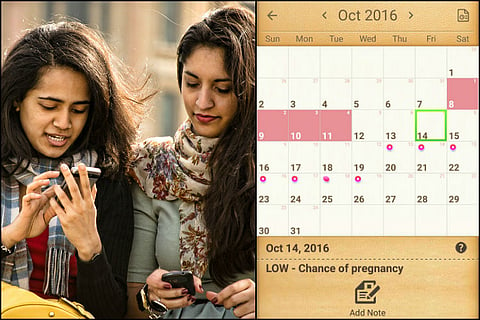

Remember that chapter on reproduction in class 10? Probably not, because flustered teachers chose to rush through or even skip it entirely. Like many others, you may have read it secretly, huddled with your friends, looking at the diagrams of the male and female reproductive systems, masking your curiosity with uncomfortable laughs and sniggers.
This story is not new to India, where sex education is seen as a corrupting influence on young minds, rather than a means to know one’s own body. Women especially have no point of reference to understand their own menstrual cycles.
22-year-old Vineetha -for instance- was utterly shocked when she got her first period when in class 7. “I couldn’t understand why blood was coming out of my vagina!” she recalls. Her mother sat her down and told her this was a normal occurrence. That was it.
It was only two years ago that she started to use a period-tracking app on her phone. Only then did she understand about ovulation, and that the sudden pimple-breakout on her face in the week preceding her period was actually part of Pre-Menstrual Syndrome (PMS).
“I actually downloaded the app as I kept losing track of the dates. But I ended up understanding my body better,” Vineetha shares.
Period-tracking apps come with a variety of features: predicting your next period, sending notifications, informing you about the days you are likely to be more fertile in your cycle, giving tips about exercise and diets to ease PMS, menstrual cramps, bloating etc.
And while many women are aware of concepts like ovulation and PMS, they often don’t relate these to their periods per se.
Mumbai-based Ayesha* for instance, started using a period-tracker about 4-5 years ago. “I stumbled onto it while browsing the app store, and was intrigued that such a thing existed. Only when I started using it, did I relate the clinical concepts I had learnt about to my own body. It made me more self-aware. Earlier, it was an impersonal affair,” she says.
She was dating a doctor at the time who he was all too happy to clear her doubts about menstruation and everything related to it. “I then started to understand what my body was trying to tell me, but I wish the conversation had happened with my mom. I wish she told me that this meant I could get pregnant now. Till class 11-12, I didn’t even know that menstruation and reproduction were linked!” Ayesha chuckles.
However, Ayesha stopped using the app recently as it did not take into account hormonal changes that come with moving cities, changing lifestyles and frequent job-changes. “I had started to rely a bit too much on it. I have started to recognize the pre-menstrual sign, like mood swings and bloating, so I can now actually do without the app,” she says.
These apps can also help women suffering from gynaecological disorders like Polycystic Ovarian Disorder (PCOD), ovarian cysts, endometriosis etc. and even help them plan pregnancies.
Being a medical student, 25-year-old Sonika did not need a period-tracking app to understand her body, but it did help her keep track of her irregular cycle due to PCOD. Her gynaecologist was then able to use the data to zero in on the right medication.
For Chennai-based Sripadma Ganapathy, a period-tracker helped plan her pregnancy in 2011: “Even though these apps aren’t always accurate in their predictions, it is a good indicator nevertheless.”
Sripadma also tends to get paranoid when her period is a day or two late, so having a record handy helps her identify if anything’s unusual or if it’s just a natural delay: “It helps me feel more confident and reassured.”
But despite the plethora of period-tracking apps in the market, not all women use it for better understanding of their bodies.
According to Sonika, for many of her friends, the apps are simply a means to minimize the risk of unwanted pregnancies. "Most of my friends who are sexually active use it to keep a tab on safe days to avoid unwanted pregnancies. It's sad because they don't know their bodies well enough, and have to rely on mobile applications which may not always be accurate," she rues.
(*Name changed on request)